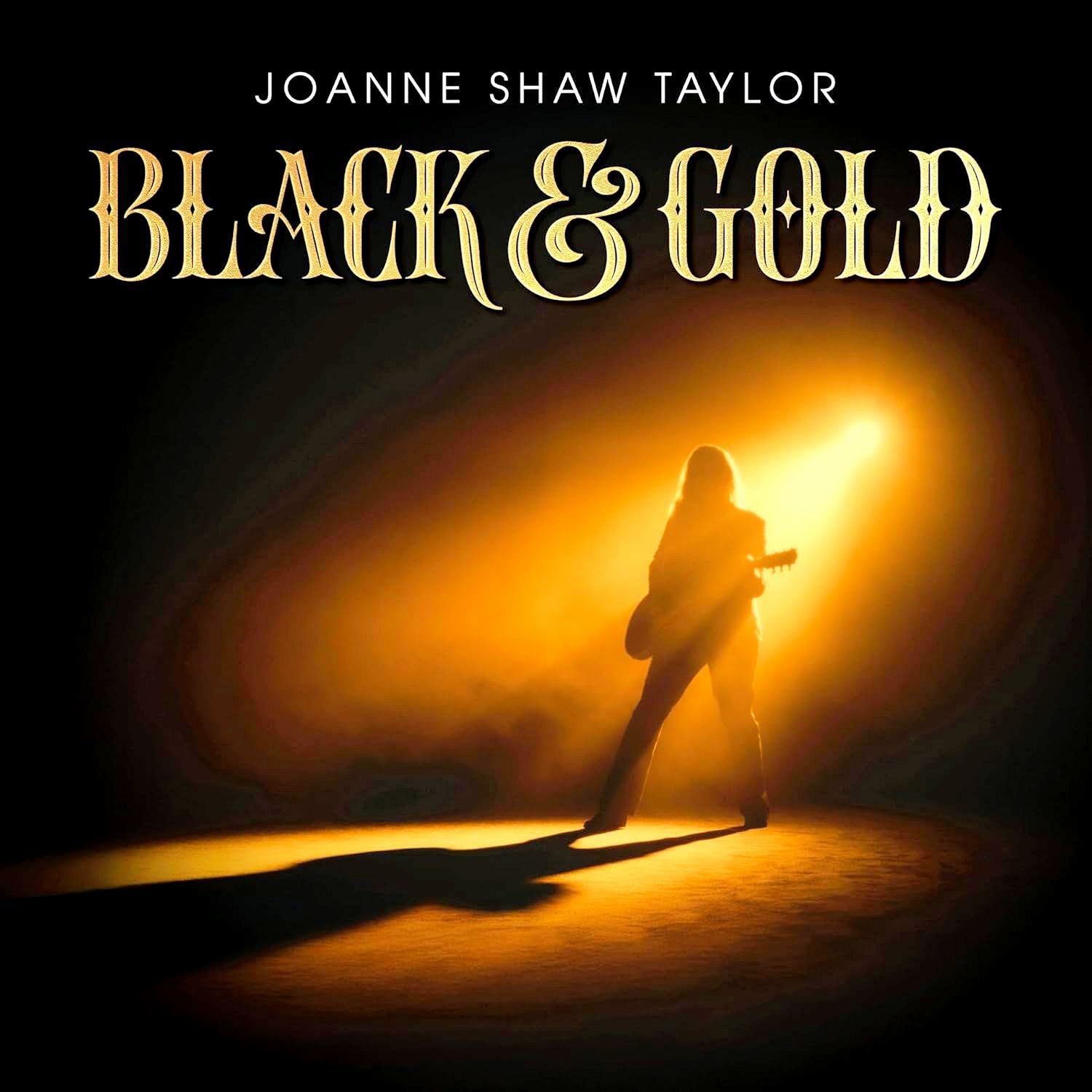Joanne Shaw Taylor – Black & Gold
Reviewed by Allister Spence • 18 August 2025

Joanne Shaw Taylor’s Black & Gold is a masterclass in emotional storytelling and genre fluidity. Her tenth studio album finds her stretching beyond the familiar shapes of blues-rock into gospel, Americana, and indie pop, all while keeping the emotional core of the blues intact. Produced by Kevin Shirley and engineered by Bob Ludwig, the record is sonically rich yet open; each instrument breathes, each lyric lands, and every guitar lick feels earned. With a stellar cast of collaborators including Anton Fig on drums, Alison Prestwood on bass, Jimmy Wallace on piano and organ, and guest appearances from Joe Bonamassa, the musicianship is flawless. But it’s Joanne’s voice; husky, expressive, and emotionally raw, that anchors the entire experience.
The album opens with “Hold Of My Heart,” co-written with Philip Whitfield, and it drifts in like magnolia-scented summer air. What begins as a gentle acoustic ballad, blooms into electric textures that mirror the emotional arc of the lyrics. There’s a crossroads energy here; Robert Johnson’s bite meets Johnny Cash’s romanticism, as fiddles and guitars dance around a melody that feels both timeless and urgent. It’s a song about risking friendship for love, and the final solo spirals like a heart collapsing. That emotional evolution carries into “All The Things I Said,” where lyrical piano and expressive guitar work highlight the echoes of pride and regret woven into the song. Joanne’s low-key vocal delivery lays waste to your emotions, and the pop-tinged sheen enhances the song’s feelings rather than thinning them. It’s sunlight through stained glass.
The title track, a reimagining of Sam Sparro’s early-2000s hit, sheds its dancefloor origins for a stripped-down gospel lament. The electro-soul gloss is gone, in its place is a rootsy, intimate cry for a lost lover. “If you’re not really here, then I don’t want to be either,” Joanne sings, her voice trembling with vulnerability. It’s raw, soulful, and haunting; rebuilt from the ground up into something deeply personal. That sense of intimacy deepens with “Who’s Gonna Love Me Now?” reportedly inspired by the loss of Joanne’s mother. Anchored by a hypnotic drum pattern and dreamlike synths, the track is mesmerizing in its stillness. The lyrics ache with grief and abandonment, and the emotional intensity never wavers.
Then the record bursts open. “I Gotta Stop Letting You Let Me Down” is a shriek of release. Gritty blues guitar kicks off before Hammond organ swells ignite the song along with riffs that spit fire. Joanne sounds gloriously unrepentant, her vocals spitting venom as she breaks free from a toxic cycle. It’s cathartic, furious, and electrifying. That swagger continues with “Hell Of A Good Time,” a blues-rock anthem that’s a hymn to hedonism. “Sinning or singing, I love living like a live wire,” Joanne declares, and the band matches her energy beat for beat. It’s unrepentantly decadent, demanding to be played loud. “What Are You Gonna Do Now?” follows with spiky honky-tonk piano and razor-sharp guitar riffs that lay waste to another (or the same?) ex. Joanne delivers lyrical blows with lines like: “You never stop talking, but you’ve nothing new to say.” It’s playful, biting, and overwhelmingly good fun.
The album’s sensitive soul returns with “Greyer Shade of Blue,” where fiddle, piano, and guitar evoke the ache of a long-term friendship ending without explanation. Joanne’s vocals carry a deep, aching sense of loss, and the chorus swells with quiet devastation. It’s one of the album’s most poignant moments. “Look What I’ve Become” continues the meditation, a haunting reflection on addiction and isolation. The gospel feel resurfaces in this widescreen ballad, which swings between heavy riffs and quiet reflection. Joanne’s vocal is defiant, and the solo feels like a cry for help turned into resolve.
“Summer Love” offers a lighter touch; a breezy, radio-friendly tune with bittersweet undertones. “It’s only forever, forever till September,” Joanne sings, capturing the transient joy of summer romance. It’s an aural postcard from sun-drenched drives and fading sunsets. The record closes with “Love Lives Here Now,” a subtle, stripped-back take on The Faces’ 1971 ballad. The gospel vibe is back, and the catchy call-and-response chorus promises to shine in a live setting. Joanne’s version is aching, open, and truly felt, a fitting end to a journey through heartbreak, healing, and hard-won joy.
Some might argue Black & Gold isn’t a pure blues album, but they’d be wrong. Every track is rooted in the blues, even as Joanne Shaw Taylor stretches the genre’s boundaries, knocks down a few walls, and grows as both performer and writer. Whether whispering regret or roaring defiance, her voice and guitar speak with clarity and conviction. This is a record of hope, heartache, and fury; all delivered with remarkable aplomb.
